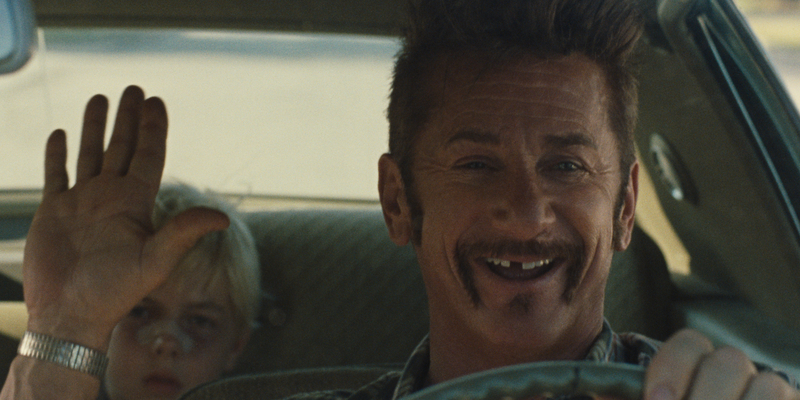
Review by
Eric Hillis
Directed by: Sean Penn
Starring: Sean Penn, Dylan Penn, Katheryn Winnick, Regina King, Josh Brolin

Alfred Hitchcock famously described drama as "life with the dull bits
cut out." As much as I respect the master of suspense, I have to
disagree with such a reductive take. Some of the greatest movies ever
made focus on what Hitch might have considered the "dull bits." In the
right hands a woman doing the dishes can be as captivating as a man
being chased through a cornfield by a crop-duster.
Sean Penn's latest directorial outing, Flag Day, however, plays a lot like a thriller with all the thrilling bits cut
out. It tells the story of John Vogel (Sean Penn), who would enter the
annals of American true crime as one of the country's most infamous
counterfeiters. Sounds like the basis for a heart-stopping suspense
thriller, right? Not so in Penn's film, which adopts the perspective of
John's initially doting but ultimately exasperated daughter Jennifer (Dylan Penn, the daughter of Sean and Robin Wright, though you would swear she was
the offspring of Patricia Arquette).

Sean takes Jennifer Vogel's memoir 'Flim-Flam Man: A True Family
History' as its basis, which means we see John solely through the eyes
of his daughter. We pick up this family dynamic in 1975, when Jennifer
is roughly 12 and John is in his late thirties. John's wife Patty (Katheryn Winnick) is one of those one-dimensional alcoholics so beloved by American
movies, and Jennifer enjoys spending time away from Mom and with her
father at the latter's log cabin. Six years later, Jennifer has become a
pot-smoking, rebellious Joan Jett lookalike and leaves her mom and
abusive stepfather to move in with John.
It's in this section that Sean's film comes to life as father and
daughter reignite their relationship. John is a trainwreck living a
Walter Mittty-esque life. He tells his daughter he's a vague
"entrepreneur", but he leaves the home each day with an empty briefcase
and works a menial job at a small airfield. Jennifer tries to convince
him that he has nothing to be ashamed of, but John is a victim of a
society that deems you a failure if you don’t wear a tie to work. Sean
and Dylan's offscreen relationship shines through in these scenes, and
if we don’t quite get to know enough about the dynamic between John and
Jennifer, we're certainly left in no doubt that the director is smitten
by his daughter, who proves a talent to watch in the future.

It's when father and daughter become separated for most of the second
half of the movie that Flag Day struggles to recapture our
attention. Jennifer goes on to become a successful journalist, but her
career path is rendered in the most simplistic of terms. An interview
for a college place features a dean of admissions who might as well use
the phrase "You've got moxey kid!" We're told of her progression up the
journalistic ladder but we're never shown the work she's rewarded
for.
In the final act John and Jennifer are reunited, but we're given
details of John's life that make us feel like we've missed out on a far
more exciting movie playing out in the background. Just like Jennifer's
rise in journalism, we're told John has become one of America's greatest
counterfeiters but we're never shown any of the details of this. How did
a man who has been portrayed as hapless throughout the whole movie
manage to pull off something so complicated?

With movies like
The Indian Runner, The Crossing Guard and
The Pledge, Sean Penn has proven himself adept at telling crime stories through a
Springsteen-esque lens. His films once had a distinctive view of the
American heartland, but too much of Flag Day looks like
he's merely copying Terrence Malick with numerous sun-bleached
flashbacks of fathers spinning children in their arms and palms
massaging wheat.
Flag Day works best when it's simply conveying the love
between a troubled parent and a child forced to grow up quickly to take
care of them. Everything else falls between decoration and
distraction.


